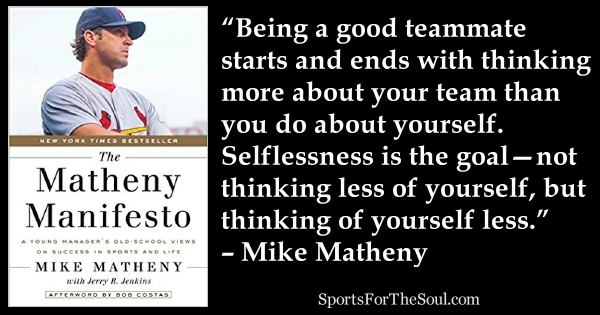 Success leaves clues and we all know that certain values like grit, optimism, discipline, and selflessness serve as the foundation for all winning programs. We know that history’s greatest coaches—from John Wooden to Dean Smith to Tom Osborne to Nick Saban—all preached the importance of teamwork and trusting “the process.”
Success leaves clues and we all know that certain values like grit, optimism, discipline, and selflessness serve as the foundation for all winning programs. We know that history’s greatest coaches—from John Wooden to Dean Smith to Tom Osborne to Nick Saban—all preached the importance of teamwork and trusting “the process.”
Mike Matheny, a four-time Gold Glove winner as a player and the first person to guide his team to the playoffs in each of his first four seasons as an MLB manager, answers an important question: If everyone knows the formula for building a winning program, why doesn’t everyone follow it?
Throughout my career, I’ve found that the organizations and coaches who emphasize winning at all costs win either only in the short run or not at all. But the ones who focus on the people, pursue perfection, strive for excellence, and emphasize getting the process right seem to also win the most over the long haul. They build great teams, and winning seems to follow.
If the formula for success is so easy, why doesn’t everyone follow it?
The short answer is that it goes against human nature. Face it, most people enjoy the spotlight, taking the credit, being the star. But even the greatest stars in the history of, say, basketball, won their championships only when they learned to make their teammates better.
Magic Johnson. Larry Bird. Michael Jordan. LeBron James.
These four were superstars before they won championships. By themselves they couldn’t carry their teams to titles. But when they also became ideal teammates, look what happened.
If there was one thing I learned early, it was how teammates ought to treat one another. It forever solidified with me that the Golden Rule applies to a baseball team as importantly as anywhere else.
My pet peeve to this day is a player not treating a teammate the way he would want to be treated, and that often requires a heathy dose of tough love—in other words, confrontation.
Being a good teammate starts and ends with thinking more about your team than you do about yourself. Selflessness is the goal—not thinking less of yourself, but thinking of yourself less.
Make no mistake, developing that mindset is not easy. It’s opposed by our culture and every fiber of our being. Instinct and billions of dollars in marketing tell kids to get what they can when they can, and do whatever they have to do to get it.
But any team that allows selfishness to permeate its structure will fail.
– Mike Matheny, from his book The Matheny Manifesto
Every coach or leader knows that in order to be successful, their teams and organizations must establish a team-first mindset. They know they must weed out selfishness and the me-first mindset that puts one individual’s desires ahead of what’s best for the team as a whole.
The problem for some leaders is that they want to avoid confrontation. And weeding out selfishness almost always requires confrontation.
It starts with calling out those who are disregarding the team-first mentality and establishing clear consequences. It can soon lead to much tougher decisions for the leader.
In sports, it may mean benching, suspending, or removing a player from the team if he or she refuses to become a team player. In business, it undoubtedly means passing over selfish employees for promotion, but it may also mean eventual firings if things don’t change.
Every leader knows that these aren’t pleasant experiences. Nobody wants to see an individual fail.
However, leaders must also approach their decisions from the perspective of what’s best for the team.
Whenever facing a difficult decision, leaders must ask themselves, “Is this decision best for the team?”
In most cases, if the decision is best for the team, it’s the right decision. If the decision benefits the individual at the expense of the team (such as, wanting to avoid confrontation with the individual), then it’s the wrong decision.
A selfish individual who refuses to change his or her ways will undermine the leader’s message of selflessness—a team won’t buy into a message if that message is ignored by others on the team without any consequences.
Selfishness will spread negativity throughout the organization if it isn’t confronted and stopped.
As Mike Matheny points out, the concept of selflessness may not be popular in our culture, but it’s essential to a team’s lasting success.
Being a leader isn’t easy. You can’t take a passive approach to leading a team.
Leadership requires making tough decisions and following through on consequences for the good of the team. And yes, that means confrontations that are sometimes unpleasant.
If a leader fails to root out selfishness, he only has himself to blame when that selfishness spreads throughout the team and keeps everyone involved from reaching their highest potential.







